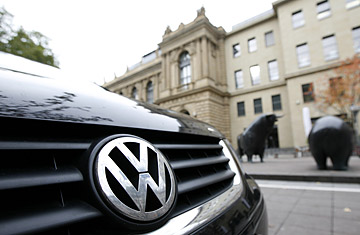
A Volkswagen car stands in front of the Deutsche Boerse stock exchange in Frankfurt, Germany, on October 29, 2008.
Anticipate an odd case of road rage this week among hedge-fund high rollers driving home while contemplating some catastrophic losses in the market, while the iconic Porsche logo on their steering wheel stares back at them. That's because the venerated Stuttgart sports-car manufacturer on Monday inflicted losses estimated to be as high as $38 billion on hedge funds, banks and other investors who had been short-selling Volkswagen stock. It was more than just patriotic fervor that got Germans cheering this week when shares in VW shot up to more than $1,276, making it, for a few minutes on Tuesday, the most valuable company in the world. It was plenty of schadenfreude, too, directed at these big foreign investor firms whose acquisition of German companies in the past has resulted in thousands of Germans losing their jobs.
VW's wild ride began when Porsche quietly announced on Sunday that it now held nearly three quarters of VW's equity, having expanded its direct stake in VW to 42.6% from 35%, and also having exercised call options on enough shares to raise its stake to 74.1%. The sports-car manufacturer's announcement that it had effectively taken control of VW was very bad news for hedge funds and banks that had taken short positions on VW shares on the assumption that their price would fall.
The scale of the losses the short-sellers would have to absorb grew rapidly as they scrambled to acquire the shares necessary to cover their positions and cut their losses. The stock price soared as it became clear that there simply wasn't enough VW stock in the market to meet demand — short-selling investors had borrowed around 13% of VW's stock, but only 6% was trading freely, the remainder being held by Porsche and the state government of Lower Saxony.
Although none are openly licking their wounds, the losses are believed to have affected a number of stalwart hedge funds. Commentators across the board blamed Porsche for causing chaos on the Frankfurt Stock Exchange this week. The daily Die Welt called Porsche the biggest German hedge fund, and criticized Germany's lax disclosure laws. Porsche has been stealthily building a stake in VW and it only retained the element of surprise because German law did not require disclosure of the positions that account for more than 30% of its stake in VW. "Only when it is no longer possible for a company like Porsche to secretly put its hands on such a large number of shares will it be impossible to catch investors wrong-footed," the paper said.
Porsche denied any responsibility for the stock market tumult caused by its announcement. And it sought to assuage its critics by promising to sell shares totaling about 5% of VW back to the market to allow banks to close their positions — at a handsome profit, of course, because Porsche first started buying VW shares when they cost $45. No one in Germany is crying any tears for the hedge fund losses, of course, but the episode has alerted many to the fact that casino capitalism isn't confined to Wall Street. And presumably some badly burned high rollers may be thinking about trading that Carrera in for a Ferrari.
